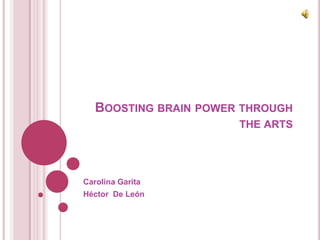
English
- 1. Boosting brain power through the arts Carolina Garita Héctor De León
- 3. Wolfgang Amadeus Mozartknown as Mozart (27 January 1756 – 5 December 1791) He composed over 600 works, many acknowledged as pinnacles of symphonic, piano, operatic, and choral music. He is among the most popular of classical composers. The most famous pupil of Mozart was Johann Nepomuk Hummel, a transitional figure between Classical and Romatic eras.
- 4. Mozart’sEffect A French doctor named Alfred Tomatis Found that Mozart's music soothed the listener, improved spatial perception, and allowed him to express himself more clearly. In this special healing ability have called "Mozart Effect."
- 5. Benefits Especially the creative process strengthens the right side of the brain associated with spatial reasoning Listen to the music of Mozart can improve our concentration and our ability to give an intuitive leap. Mozart's music has a healing and liberating power. Mozart's music can balance our energy in an extraordinary way, not too fast nor too slow, is perfect.
- 6. Mozart's music has, among others, the following positive effects: the development of skills for reading and writing, oral language development, math skills, developing the ability to remember and memorize.
- 8. Another frequently used method for neural stimulation includes playing classical music selections in the background while the child is doing other things including during their “nap time”. Beethoven, Brahms and Mozart especially, are classical music composers often used for this purpose. While the music is relaxing, it’s also able to activate multiple areas of a child’s brain. Surprisingly, smooth jazz (vocals) has been found to be an excellent auditory stimulant for young learners in a broad range of situations. Early Childhood Development: Audio Stimulation Techniques
- 9. THANKS!!!!!